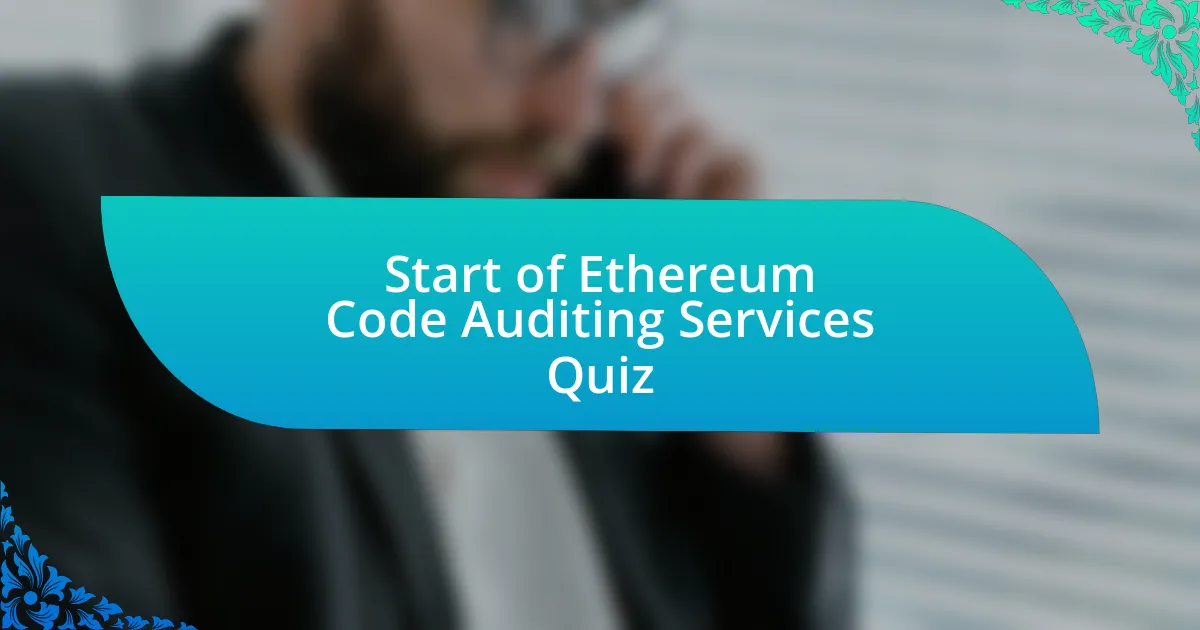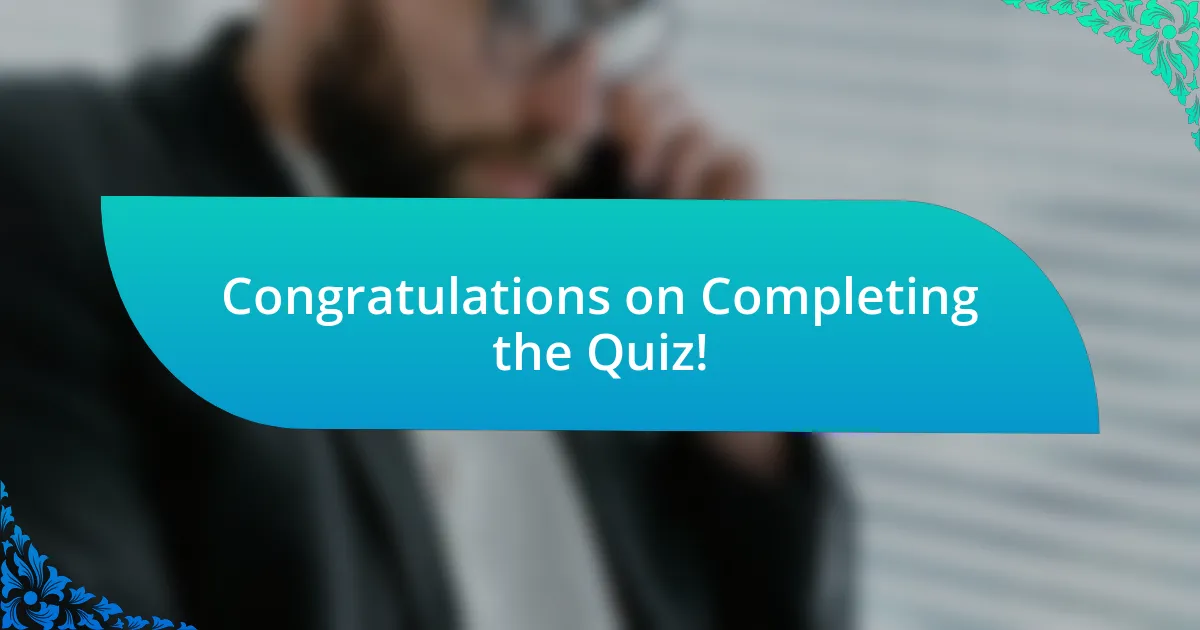
Start of Ethereum Code Auditing Services Quiz
1. What is the primary purpose of conducting an Ethereum code audit?
- To increase transaction speed by optimizing the blockchain.
- To ensure all users can access the contract for free.
- To prevent breaches and financial losses by identifying and addressing vulnerabilities in the code.
- To promote the contract across various platforms and websites.
2. What types of vulnerabilities can Ethereum code auditing services identify?
- Network congestion and transaction delay
- Reentrant calls and timestamp issues
- Cryptographic hashing and gas fees
- User interface bugs and wallet connectivity
3. How often should Ethereum smart contract audits be performed?
- Only before launch
- Every two years
- After every major update
- Once a year
4. What is the significance of using both automated and manual auditing methods?
- It combines efficiency and thoroughness for a comprehensive security assessment.
- It eliminates the need for expert reviews in auditing processes.
- It is mainly used for user interface quality checks.
- It focuses solely on manual testing to save costs.
5. What best practices should developers follow for secure Ethereum contract development?
- Writing untested code and deploying immediately.
- Regular security audits and code reviews.
- Relying solely on automated tools for security.
- Ignoring external libraries and dependencies.
6. How can developers ensure the quality of their smart contracts before launch?
- Increase software update frequency before launch.
- Write more complex code to surprise hackers.
- Conduct thorough audits with professional firms.
- Reduce the transparency of contract details.
7. What is the impact of code complexity on Ethereum smart contract audits?
- It reduces the overall cost of the audit.
- It simplifies code interpretation for easier audits.
- It increases the risk of vulnerabilities and errors during audits.
- It has no significant impact on the audit process.
8. Which organizations typically provide Ethereum smart contract auditing services?
- Microsoft Green
- Google Ventures
- Oracle Innovations
- ConsenSys Diligence
9. How does security analysis contribute to Ethereum development tools?
- It helps identify vulnerabilities early in the development process.
- It reduces transaction speeds for Ethereum-based applications.
- It limits the scalability of Ethereum networks significantly.
- It increases the complexity of smart contract coding standards.
10. What are the consequences of not auditing a smart contract before deployment?
- Financial losses due to unaddressed vulnerabilities.
- Guaranteed success and profit upon launch.
- Increased visibility and exposure in the market.
- Improved performance and faster transactions.
11. How does thorough documentation aid in the auditing process of Ethereum projects?
- It helps ensure code safety and compliance by providing clear guidance on security practices.
- It enables faster transaction processing and reduces network congestion.
- It increases the number of transactions per second during peak times.
- It optimizes the coding by minimizing the required lines of code.
12. What are the common pitfalls developers face that lead to security breaches in smart contracts?
- Poor coding practices
- Using outdated programming languages
- Lack of user feedback
- Ignoring front-end development
13. In what ways can automated tools enhance the auditing process of Ethereum contracts?
- It generates random contract states to ensure uniqueness.
- It provides affordable smart contract security options and the peace of mind that the code is fortified.
- It automates the creation of new tokens for the network.
- It limits the deployment of contracts to reduce network congestion.
14. What is the importance of peer reviews in the Ethereum code auditing process?
- It guarantees that all code will run without errors.
- It increases fees for transactions on the network.
- It fosters collaboration and enhances security by identifying potential vulnerabilities.
- It allows any user to directly deploy smart contracts.
15. How do development frameworks like Hardhat assist in the auditing of smart contracts?
- It provides automated testing and analysis tools for identifying vulnerabilities.
- It allows users to create visual representations of smart contracts.
- It offers a user-friendly interface for writing transaction scripts.
- It enables the deployment of smart contracts on multiple blockchains.
16. What role does gas optimization play in the auditing of Ethereum contracts?
- Gas optimization minimizes transaction costs and enhances contract efficiency during audits.
- Gas optimization ensures that contracts can be executed without any errors.
- Gas optimization guarantees that all contract functions run instantly.
- Gas optimization is primarily for increasing the contract`s coding complexity.
17. Why is it essential to verify third-party libraries used in smart contracts?
- To ensure the safety of users` funds and prevent exploitations.
- To reduce the overall transaction fees on the network.
- To increase the speed of the smart contract execution.
- To enhance the graphical interface of the smart contract.
18. How can developers mitigate risks associated with oracle-based dependencies?
- Eliminate all external dependencies.
- Conduct regular security audits.
- Increase code complexity.
- Avoid testing throughout development.
19. What constitutes a comprehensive audit report for Ethereum smart contracts?
- A simple checklist of best practices for writing smart contracts.
- A brief summary of development milestones and team contributions.
- An overview of blockchain principles and technology trends.
- A comprehensive report with vulnerability details, mitigation guidance, and options for continuous verification.
20. How do Ethereum auditing firms ensure compliance with best coding practices?
- By implementing random coding techniques without any guidelines.
- By relying solely on the developer`s experience without verification.
- By conducting thorough code reviews and testing with automated tools.
- By ignoring potential vulnerabilities and focusing on performance.
21. What factors determine the length of time an Ethereum audit might take?
- The complexity of the smart contract and the thoroughness of the audit.
- The popularity of the Ethereum network on that day.
- The number of developers involved in the project.
- The weather in the audit firm`s location.
22. How can continuous integration tools facilitate regular audits during development?
- By only checking code once the project is completed.
- By automatically running tests and checks throughout the coding process.
- By enabling developers to write code faster without errors.
- By focusing solely on documentation rather than the code itself.
23. How does Solidity`s gas estimation affect smart contract auditing?
- It ensures unlimited gas is available for transactions.
- It guarantees that all code is free of bugs.
- It helps identify gas inefficiencies that could lead to vulnerabilities.
- It prevents all possible hacks from occurring.
24. What is the relevance of security audits to the overall health of the Ethereum ecosystem?
- Security audits identify vulnerabilities and protect against risks.
- Security audits focus on increasing transaction speeds and volumes.
- Security audits validate the accuracy of Ethereum price predictions.
- Security audits promote financial gains by investing in assets.
25. What is the relationship between smart contract audits and user trust in dApps?
- Smart contract audits are unnecessary for decentralized applications.
- Smart contract audits build user trust by verifying security and functionality.
- Smart contract audits are mainly for increasing transaction speeds.
- Smart contract audits decrease the cost of development projects.
26. How can change management processes mitigate risks in Ethereum development?
- By allowing any changes to be made without oversight.
- By avoiding the use of automated testing tools.
- By establishing clear protocols and documentation practices.
- By eliminating the need for code reviews.
27. What key indicators suggest that an Ethereum contract may require immediate auditing?
- Optimized gas usage
- Clear function names
- Stable price oracles
- Uninitialized storage variables
28. How does understanding common attack vectors aid in the auditing process?
- It ensures compliance with regulatory standards.
- It increases the overall coding efficiency.
- It allows for faster code deployment.
- It helps identify and mitigate potential vulnerabilities.
29. What specific vulnerabilities related to reentrancy should auditors look for?
- Overflow vulnerabilities
- Gas limit vulnerabilities
- Memory leaks
- Timestamp vulnerabilities
30. How do changes in Ethereum’s protocol impact smart contract audits?
- They have no impact and audits remain the same.
- They only affect the transaction speed of smart contracts.
- They require updates to audit methodologies to align with changes.
- They eliminate the need for audits due to improved security.

Congratulations on Completing the Quiz!
You’ve successfully navigated through the quiz on Ethereum Code Auditing Services. We hope you found the experience enlightening and engaging. As you answered each question, you likely gained insights into the importance of code auditing in the Ethereum ecosystem. Understanding these concepts is crucial in ensuring the security and integrity of smart contracts.
Throughout the quiz, you may have learned about different auditing techniques, common vulnerabilities, and the role of auditors in maintaining blockchain security. These topics are vital as they contribute to the overall trustworthiness of decentralized applications. Moreover, being well-informed can help you make better decisions in your projects and investments.
To further enhance your understanding of Ethereum Code Auditing Services, we invite you to check the next section on this page. It contains valuable information that will expand your knowledge and deepen your comprehension of the subject. Continue exploring, and empower yourself with the knowledge to navigate the Ethereum landscape confidently.

Ethereum Code Auditing Services
Understanding Ethereum Code Auditing Services
Ethereum code auditing services refer to systematic evaluations of smart contracts and decentralized applications built on the Ethereum blockchain. The primary goal is to identify vulnerabilities, bugs, and inefficiencies in the code. This process enhances security, optimizes performance, and ensures compliance with industry standards. Auditing is critical due to the potential financial implications of smart contract failures, as highlighted by numerous high-profile hacks in the blockchain space.
The Importance of Smart Contract Security in Ethereum
Smart contracts are self-executing contracts with terms directly written into code. Their security is paramount, as bugs can lead to significant financial losses. Vulnerabilities can be exploited by malicious actors, resulting in unauthorized access or fund theft. The Ethereum platform’s decentralized nature means that mistakes can be irreversible. Thus, rigorous auditing of these contracts is essential for fostering trust among users.
Components of an Ethereum Code Audit
An Ethereum code audit typically includes several key components. These are code review, vulnerability assessment, and performance analysis. The code review involves a comprehensive analysis of the smart contract’s logic and syntax. Vulnerability assessments focus on identifying common issues such as reentrancy attacks, overflow/underflow errors, and improper access control. Performance analysis checks for optimization opportunities to enhance efficiency and lower transaction costs.
Types of Ethereum Code Audits
There are generally two types of Ethereum code audits: manual audits and automated audits. Manual audits involve experienced auditors thoroughly reviewing the code line by line. This method allows for nuanced analysis but can be time-consuming. Automated audits leverage specialized tools to scan the code for known vulnerabilities. While quicker, they may not catch complex issues. Many firms combine both methods for comprehensive assessments.
Choosing an Ethereum Code Auditing Service Provider
When selecting an Ethereum code auditing service provider, consider their expertise, reputation, and range of services. Look for providers with a proven track record in the Ethereum ecosystem. Check for review and testimonials from previous clients. Additionally, the auditing process should be transparent, with detailed reports provided after the audit. This ensures that you fully understand the vulnerabilities identified and the recommended fixes.
What are Ethereum Code Auditing Services?
Ethereum Code Auditing Services are professional assessments that analyze and review smart contracts deployed on the Ethereum blockchain. These services identify vulnerabilities, inefficiencies, and compliance issues within the smart contract code. Auditors use industry-standard methodologies and tools to ensure the code functions as intended and is secure from external attacks.
How do Ethereum Code Auditing Services work?
Ethereum Code Auditing Services typically involve several steps. First, auditors review the smart contract’s source code for potential errors or vulnerabilities. Next, they simulate attacks to identify weaknesses. Finally, they provide a detailed report that includes findings, recommendations, and guidelines for improving security. This process can significantly enhance the overall integrity of the smart contract.
Where can you find Ethereum Code Auditing Services?
You can find Ethereum Code Auditing Services through specialized firms that focus on blockchain technology and smart contract development. Many reputable companies offer these services as part of their solutions. Online marketplaces and freelancer platforms also connect developers with auditing professionals who have expertise in Ethereum smart contracts.
When should you consider Ethereum Code Auditing Services?
You should consider Ethereum Code Auditing Services before deploying a smart contract on the Ethereum network. Conducting an audit during the development phase is essential. It helps catch vulnerabilities early, preventing potential financial losses or exploits once the contract is live. Regular audits are advisable for existing contracts, especially after significant changes or updates.
Who provides Ethereum Code Auditing Services?
Ethereum Code Auditing Services are provided by a range of professionals, including blockchain consulting firms, cybersecurity companies, and independent auditors with expertise in Ethereum contracts. Many of these providers have extensive experience in smart contract development and security assessments, which ensures a thorough evaluation of the code.

